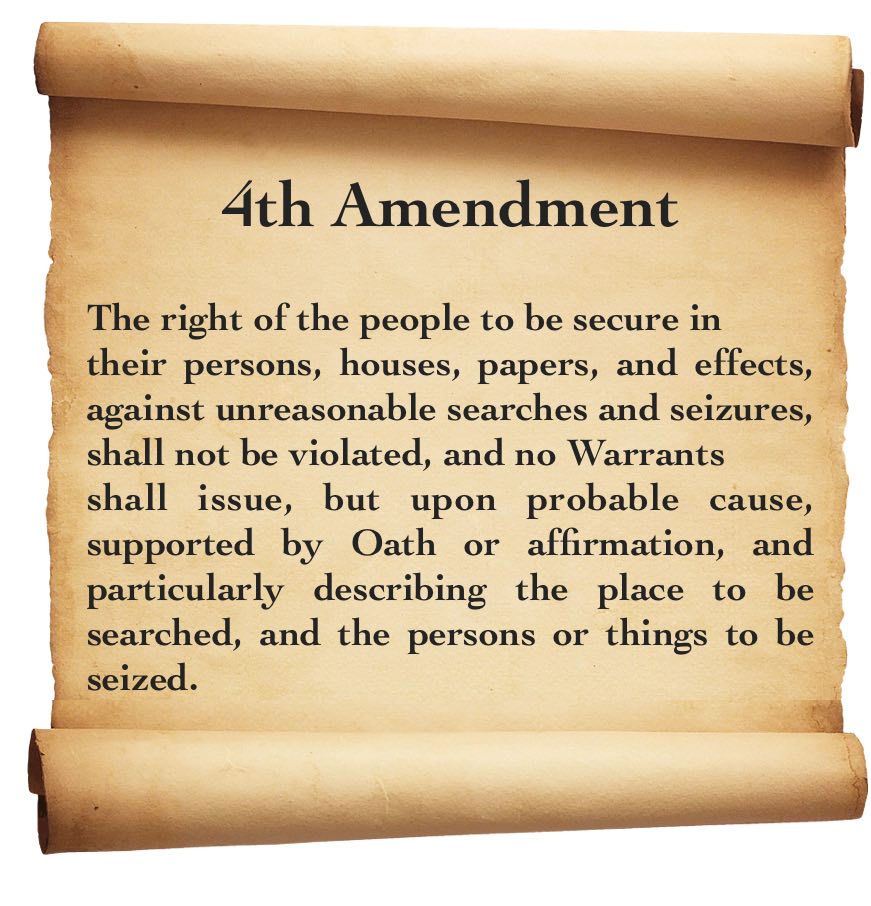Fourth Amendment Violations:
Assault On Privacy
Constitutional violations in Ross Ulbricht’s investigation were a primary argument in the Supreme Court petition, which was supported by 21 organizations from across the political spectrum.[1]
In violation of the Fourth Amendment, federal agents used an array of electronic tools during the investigation—all without a warrant or probable cause—to illegally spy on Ross Ulbricht. They used pen-traps on his home router and laptop (essentially turning the laptop into a tracking device), seized his Internet browsing history, and used a directional antenna to track him from room to room in his home.
In the digital age, nearly every aspect of our lives is recorded online. Whether the government can secretly gather that information without a warrant, and use it against you, was a question in Ross’s petition to the Supreme Court.
“Is it reasonable to say that the ordinary citizen ‘assumes the risk’ that their Internet browsing activity will be monitored by the government with a pen/trap device every time they log on to the Internet? The answer is plainly ‘No.'”
– Reason Foundation, CATO Institute, Competitive Entreprise Institute, and R Street Institute in support of Ross’s Supreme Court petition.[1]
Starting with only his email address and without a warrant, federal agents used pen register and trap-and-trace devices (pen-traps) to locate Ross’s home and collect all the internet traffic information flowing through his router and laptop.
“While ostensibly a pen-trap reveals only identifying information, these pen-traps had an ulterior purpose: to track Ulbricht’s internet activity and his physical location in an effort to connect him with access to the administrative section of the Silk Road Servers at particular times on particular date.”
– Excerpt from Ross’s appeal.[2]
“The government’s warrantless collection of the IP addresses a citizen visits is analogous to a government agent peering through the window to monitor which books a person pulls from their shelf.” This “effectively gives the government a blank check to conduct a dragnet search of Internet activity.”
– Reason Foundation, Cato Insitute, CEI, and R Street Institute in a brief in support of the Supreme Court petition.[3][4]
This could be done because of an outdated legal theory from the 1970’s called the Third-Party Doctrine.[5] This doctrine was born in the context of rotary telephone technology and established that the numbers you dial are not private because you voluntarily convey them to the telephone company (the third party).
Today, the same antiquated legal theory is applied to the vast amount of private information conveyed through third parties online.
“Blunt application of the third-party doctrine threatens to allow the government access to a staggering amount of information that surely must be protected under the Fourth Amendment.”
– Chief Judge Martin quoted in a brief by the National Lawyers Guild and others in support of Ross’s Supreme Court petition.[6]
“The warrants here represent the antithesis of “particularity” not only in execution, but also in design, language, and purpose.”
– Excerpt from Ross’s appeal.[7]
“Thus, the entirety of Ulbricht’s private “papers,” and more (i.e., his internet history, political or other associations) were expressly targeted by the government.”
– Excerpt from Ross’s appeal.[8]
References
- ▲[1] – Amicus brief from Cato Institute, Reason Foundation, CEI, and R Street Institute (page 10)
- ▲[2] – Appeal brief (page 110)
- ▲[3] – Amicus brief from Cato Institute, Reason Foundation, CEI, and R Street Institute (page 22)
- ▲[4] – Amicus brief from Cato Institute, Reason Foundation, CEI, and R Street Institute (page 24)
- ▲[5] – Third-Party Doctrine, Wikipedia
- ▲[6] – Amicus brief from National Lawyers Guild and seven other amici (page 4)
- ▲[7] – Appeal brief (page 98)
- ▲[8] – Appeal brief (page 100)

